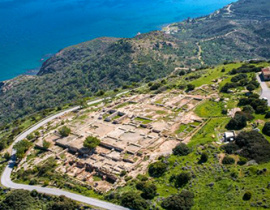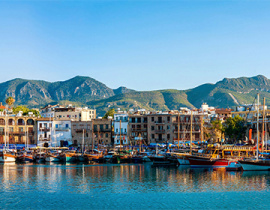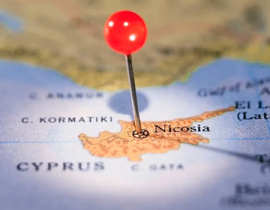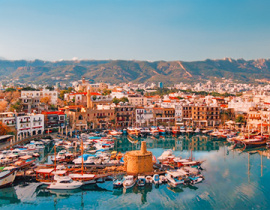- Home
- Blog
- Tips & Advice
- North Cyprus Travel Requirements and Tips
North Cyprus Travel Requirements and Tips
Traveling to North Cyprus is an exciting opportunity for adventure, culture, and relaxation. However, before you pack your bags, it’s important to understand the key rules and regulations in North Cyprus to ensure a smooth and stress-free experience. From entry requirements to everyday laws—such as the unique driving rules in North Cyprus—there are several essential details every traveler should know. In this guide, we’ll walk you through the most important regulations to be aware of. Be sure to review these tips and familiarize yourself with the North Cyprus travel requirements before you book your ticket or set off on your journey.
North Cyprus Travel Guide: Rules and Regulations
North Cyprus, officially known as the Turkish Republic of Northern Cyprus (TRNC), shares its official language and currency with Turkey—Turkish and the Turkish Lira. Although Turkish, the official language of North Cyprus is the primary language spoken, English is widely understood thanks to the large expat community and the internationally educated local population, making communication relatively easy for visitors.
While the Turkish Lira is the main currency used in North Cyprus for daily transactions, Euros, US Dollars, and British Pounds are also commonly accepted, especially in tourist areas. However, paying in Turkish Lira is recommended for the best value and to avoid unfavorable exchange rates. Credit cards are widely accepted in major hotels, restaurants, and larger shops, but smaller vendors, local markets, taxis, and rural areas often require cash, so it’s wise to keep some cash on hand.
Entry Requirements for North Cyprus: Visas and Travel Documents
There are two primary ways to enter North Cyprus: directly via Turkey or by crossing the border from Southern Cyprus. Most international travelers choose to arrive in the northern part of the island by flying from Turkey to Ercan International Airport, located near Nicosia. Especially since major airlines operate regular connecting flights through Turkey. Alternatively, visitors can cross into North Cyprus through designated border checkpoints from South Cyprus. While this is possible with valid travel documents, entering from Southern Cyprus involves additional legal and practical considerations that travelers should be aware of.
 Under the current visa policy for North Cyprus, many travelers—including those from the United Kingdom, European Union, and the United States—do not require a visa for touristic stays of up to 90 days. Entry permission is granted upon arrival at border crossings or ports. However, citizens of certain countries such as Syria, Armenia, and Nigeria are required to obtain a visa in advance.
Under the current visa policy for North Cyprus, many travelers—including those from the United Kingdom, European Union, and the United States—do not require a visa for touristic stays of up to 90 days. Entry permission is granted upon arrival at border crossings or ports. However, citizens of certain countries such as Syria, Armenia, and Nigeria are required to obtain a visa in advance.
When entering North Cyprus, tourists staying at a hotel or rental accommodation are typically granted an initial stay of up to 30 days. If travelers can provide proof of a longer paid accommodation booking prior to arrival, a visa or entry permit of up to 90 days may be issued.
For non-touristic visits—including official trips, business meetings, conferences, fairs, exhibitions, medical tourism, and similar purposes—a visa or special entry permit of up to 90 days can also be arranged, provided relevant documentation is submitted.
EU and Schengen Area citizens can enter North Cyprus by presenting their National Identity Card. Visitors from other countries must show a valid passport. If the traveler is a citizen of a country that has an Embassy, Consulate General, Consulate, or Representative Office in either North Cyprus or in EU countries, a passport or travel document valid for at least two months is sufficient. However, travelers from countries without such diplomatic presence must hold a passport or travel document valid for at least six months.
Once all entry requirements for North Cyprus are met, visitors are issued a white entry slip, which must be filled out with personal information. No stamp is placed on your passport—instead, both entry and exit stamps are placed on this white slip, which effectively serves as your temporary passport during your stay in North Cyprus. Be sure to keep this document safe and carry it with you at all times throughout your visit.
When entering, visitors may need to show proof of sufficient funds, accommodation, and the purpose of their visit. Additionally, to stay longer than 90 days, a North Cyprus residence permit is required.
Documents Needed for North Cyprus Travel: A Checklist
Before your trip, make sure you’re prepared with the right paperwork. Here's what you’ll typically need:
- A valid passport or ID card (EU/Schengen citizens may use a national ID)
- Visa on arrival or a prior visa, depending on your nationality
- Proof of accommodation, such as a hotel booking or rental contract
- Documents supporting the purpose of your visit, such as an invitation letter, conference registration, or medical appointment
Permanent Residency in North Cyprus: What Are the Requirements?
Besides visiting for leisure and investment purposes, many foreigners choose to pursue North Cyprus permanent residence. To stay beyond the standard 90-day limit, applicants must secure a residence permit in North Cyprus through the official government portal by submitting the necessary documentation.
According to North Cyprus residency requirements, foreigners become eligible to apply for permanent residency after legally residing on the island for a minimum of five continuous years under temporary residence permits. These temporary permits must be renewed annually. Typically, applicants must reside in North Cyprus for at least six months per year to maintain eligibility. In North Cyprus, residence permits that are temporary must be renewed annually. To eventually qualify for permanent residency in North Cyprus, applicants are generally required to live in the country for a minimum of six months per year.
While this outlines the general process, it's worth noting that there are various types of residency, North Cyprus offers, each with specific criteria. If you’re considering long-term settlement or citizenship, it’s also important to understand the North Cyprus nationality rules, which outline eligibility for naturalization and dual citizenship. With the new residency rules North Cyprus has introduced, regulations have become more favorable—particularly for property owners. For instance, those holding a valid title deed can now maintain a 5-year North Cyprus residency without needing to meet income requirements. Additionally, North Cyprus residency requirements for senior property owners aged 60 and over have been eased, with health insurance only required once every five years.
These are just a few of the many positive updates to North Cyprus residency policies. If you're considering applying for a residence permit in North Cyprus, be sure to explore our detailed guide: How to Get a Residence Permit in North Cyprus?
Local Laws and Travel Safety in North Cyprus
 If you're traveling to North Cyprus, it's perfectly normal to wonder about the country's safety, healthcare, and local laws. So, is it safe to travel to North Cyprus? The answer is yes — North Cyprus safety standards are high, making it one of the most secure destinations in the Mediterranean. Crime rates are significantly lower than in many European countries and even lower than in Southern Cyprus. While violent crime is rare and petty theft is uncommon, tourists should still take standard precautions, just as they would when visiting any other part of Europe.
If you're traveling to North Cyprus, it's perfectly normal to wonder about the country's safety, healthcare, and local laws. So, is it safe to travel to North Cyprus? The answer is yes — North Cyprus safety standards are high, making it one of the most secure destinations in the Mediterranean. Crime rates are significantly lower than in many European countries and even lower than in Southern Cyprus. While violent crime is rare and petty theft is uncommon, tourists should still take standard precautions, just as they would when visiting any other part of Europe.
Health in North Cyprus
In terms of health and safety in North Cyprus, the country is free of infectious diseases and does not require any vaccinations for entry. Emergency treatment in public hospitals is free of charge, and private clinics are also available, even in rural areas. However, when planning your trip, be sure to include travel insurance for North Cyprus that covers health-related expenses, for added peace of mind.
Emergency Numbers
It's also a good idea to save a list of emergency numbers in North Cyprus to ensure quick assistance in case of unexpected situations, including:
- Police (155) and local police of the town,
- Ambulance (112)
- Fire Department (199) and Forest Fire (177)
Traffic and Driving in North Cyprus
Traffic: One of the most important travel tips for North Cyprus involves transportation. Driving rules in North Cyprus differ from many countries, as the traffic flows on the left side of the road. This aspect of transportation in North Cyprus can be a bit challenging and can take some getting used to.
Driving: Tourists can drive using their national license for up to 30–90 days, depending on visa regulations. If you intend to stay longer, you’ll need to obtain a North Cyprus driving license. Understanding and respecting North Cyprus driving rules is key to staying safe and avoiding fines.
North Cyprus Travel Tips
North Cyprus is also pet-friendly. As of early 2025, strengthened animal protection laws have made it a safer place for pets. If you’re bringing your pet along, make sure to follow standard international pet travel regulations.
Strict drug laws are also part of North Cyprus tourist information that visitors should be aware of. Drug-related offenses carry heavy penalties, with sentences ranging from 8 years to life imprisonment depending on the severity and type. While life sentences have not been issued, enforcement has become more rigorous in recent years. However, medical cannabis oil is now permitted under specific conditions for advanced cancer patients.
Lastly, one critical legal note involves military zones. These areas are marked with red “No Photography” signs, and it is illegal to take photos in or near them. Being mindful of these restrictions is essential for a smooth and trouble-free stay.
Rules and Regulations Affecting Entertainment in North Cyprus
 North Cyprus offers plenty of options for fun, leisure, and adventure — from nightlife and casinos to fishing and hunting. However, like in any country, there are rules and regulations in North Cyprus that govern these activities. Understanding them is key to enjoying your stay legally and responsibly. Here’s a breakdown of what you need to know about alcohol, gambling, fishing, and hunting laws in North Cyprus.
North Cyprus offers plenty of options for fun, leisure, and adventure — from nightlife and casinos to fishing and hunting. However, like in any country, there are rules and regulations in North Cyprus that govern these activities. Understanding them is key to enjoying your stay legally and responsibly. Here’s a breakdown of what you need to know about alcohol, gambling, fishing, and hunting laws in North Cyprus.
Drinking Rules and Restrictions
The legal drinking age in North Cyprus is 18. Individuals must be at least 18 years old to legally purchase or consume alcohol. The import and export of alcohol are also subject to regulation — importing more than 5 liters per person is prohibited. When crossing the Green Line (the border between North and South Cyprus), travelers are allowed to carry only 1 liter of alcohol duty-free.
Drinking and driving is strictly prohibited and heavily penalized. Recent regulations now restrict the sale of alcohol in shops after 10:00 p.m. However, there are no restrictions on the consumption of alcohol at licensed venues, and day drinking at bars and restaurants is both legal and culturally accepted. Drinking alcohol in public spaces, especially in municipal parks such as those in Kyrenia, is forbidden and may result in fines.
Gambling Laws in North Cyprus
Is gambling legal in North Cyprus? Yes — gambling is legal in North Cyprus under licensed conditions. Land-based casinos operate legally and offer a wide range of games, including table games. Sports betting on horse and dog races, as well as participation in state lotteries, is also permitted. While online gambling is banned in the Republic of Cyprus, North Cyprus has fewer restrictions, and the casino industry thrives, attracting many international visitors.
Fishing and Hunting Regulations
Fishing and hunting are among the most popular outdoor activities in North Cyprus, but both are regulated to protect local wildlife and natural resources.
For recreational fishing, no license is required when using a rod or spinning gear from the seashore or a boat. However, other methods — including freshwater fishing, spearfishing, and commercial fishing — do require a license. Spearfishing is prohibited in swimming zones, and using scuba gear during spearfishing is not allowed. Selling fish without a commercial license is also illegal.
Freshwater fishing is limited: no boats are allowed, and only one rod, one line, and one hook per person may be used. Fishing is allowed from one hour before sunrise to one hour after sunset, and equipment must be removed no later than 1.5 hours after sunset. Catch limits apply, and certain species like carp and bass must be released during breeding seasons in March and April. Juvenile fish must also be released, and species such as trout, sturgeon, and pike have daily catch limits.
Hunting in North Cyprus is also tightly regulated. A valid hunting license is required, and only those with a residency permit in North Cyprus can apply. Foreign nationals must submit identification, proof of residency, recent photos, a criminal background check, and a medical certificate. Hunting is allowed only on designated days and within permitted times — from sunrise to sunset. Authorities strictly monitor compliance.
Local Customs and Rules in Daily Life in North Cyprus
 North Cyprus offers a unique cultural blend, where Turkish traditions meet Western influences. These cultural elements shape not only the lifestyle but also the unspoken rules of daily interaction. Understanding and respecting these local customs in North Cyprus can enrich your travel experience and help you connect with the local community.
North Cyprus offers a unique cultural blend, where Turkish traditions meet Western influences. These cultural elements shape not only the lifestyle but also the unspoken rules of daily interaction. Understanding and respecting these local customs in North Cyprus can enrich your travel experience and help you connect with the local community.
Family life holds a central place in North Cyprus, and strong values such as respect for elders, pregnant women, and guests are deeply ingrained in society. When visiting or living in North Cyprus and meeting locals, it’s appreciated to be polite and show genuine interest in their customs and way of life. Hospitality is a core part of the culture — it’s not uncommon for Cypriots to warmly welcome strangers into their homes for drinks or meals. Conversations may feel personal or even intrusive by some Western standards, as locals might ask about your family or background. However, this is a sign of friendliness. That said, it’s wise to avoid discussing sensitive topics about Cyprus.
Public behavior is also taken seriously. Littering is both socially frowned upon and legally prohibited, with significant fines in place. Cleanliness and care for the environment — including the protection of animals — are seen as shared responsibilities.
If you’re traveling to North Cyprus, keep in mind the influence of Mediterranean siesta culture on the local rhythm of life. In many towns, especially smaller or more traditional areas, an afternoon break is observed. During siesta hours, typically between early afternoon and early evening, shops and businesses may close or operate with reduced hours.
When visiting religious sites — whether churches, monasteries, or mosques — dressing modestly is expected. Local rules in North Cyprus around attire are strictly enforced in these places. Both men and women should cover their legs and upper body. Women are also expected to cover their shoulders and, when entering mosques, to wear a headscarf. Shoes must be removed before entering any mosque as a sign of respect.
With a clear understanding of how to prepare for your North Cyprus travel, you can move forward confidently and focus on enjoying the island's unique offerings.









